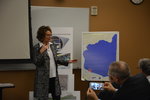

VANCOUVER — A packed room at the Clark County East Campus was filled with locals eager to hear and speak about concerns regarding a solution to Columbia River transit.
A “Transportation Solutions” town hall featuring four plans and several public comments took place Saturday, highlighting possible projects from a flyover on Interstate 5 to a tunnel under the Columbia.
The event was hosted by two local legislators, Reps. Liz Pike, R-Camas, and Vicki Kraft, R-Vancouver, in an effort to involve the public with this year’s push to solve the problem initially the focus of the failed Columbia River Crossing project.
Kevin Peterson was the lead presenter who provided an overview on what issues Clark County faced in finding a solution. Peterson, who has been involved in numerous global projects including Bangkok and Istanbul, reasoned that the four designs and presentations would be in excess of $1 million had the work been charged to the community, “ideas that were basically volunteer efforts by professionals and concerned citizens,” as he phrased it, adding he was impressed that the collaboration was able to happen.
One design presented was a “New West Express,” a multi-phase project providing a new thoroughfare west of the existing I-5 going from downtown Portland up to north of the I-205 northern terminus, linking up several times with existing roads.
Dave Nelson, a local retired transportation engineer, presented an I-5 flyover as one of the solutions. He said that what happened with the CRC is that the bill payers — the legislators on both sides of the river — were pushed out of the process of coming up with a solution which ultimately led to its demise.
Russell Call of bridge engineering firm FIGG presented an East County solution, drawing on a previous plan that had been crafted several years prior.
The final proposal was to construct a tunnel for transit going under the Columbia River. Rep. Kraft commented that she found that project the most “intriguing” of the projects examined.
Clark County business owner Bill Huyette presented the tunnel concept, which he described as “an alternative” to the massive land acquisition and bridge construction that would be a result of the other proposals.
Although price tags weren’t the focus of the presentations, one presenter, Bill Wagner, made comment that for the New West Express the cost would be “billions” over the next 20 years.
Close to an hour of public comment resulted from the presentations, with comments focusing on everything from environmental impacts to the use of mass transit, specifically light rail which had been a sticking point with the CRC. Most of the dialogue had to deal with passenger transportation, though at the very end freight mobility, one of Pike’s chief focuses with her transportation efforts, was brought up as an issue.
Local former legislator Al Bauer was one of several who spoke, thanking Pike for bringing alternatives to the table in the forum. He urged Pike’s support of another bill in the Senate sponsored by Annette Cleveland, D-Vancouver, along with several other local politicians, as it picked up on previous studies done during CRC work that had cost $200 million already.
“We had an agreement with all the parties involved. We had permits all purchased, and they all went down the drain by a vote in the Senate,” Bauer remarked.
“If you want something immediate, this is preferable over all the other options that could be presented,” Bauer said about Cleveland’s bill.
Pike then took time to point at a map of Clark County, colored based on votes the last time residents were asked about light rail, a component of the CRC. Only five of the precincts in the county were in favor as depicted on the map — none of which were in Pike’s district bounds.
“I have my marching orders pretty clear from my voters,” Pike remarked.
Pike then explained why she wasn’t in support of Cleveland’s bill, listing specifically what it lacked compared to Pike’s own piece of legislation, HB 1222. Pike said unlike Cleveland’s legislation, her bill had a provision for 10, 25 and 50-year long-term plans and focused on all available alternatives, not strictly on I-5, as evidenced in proposals all across (and under) the river made on Saturday.
Kraft, who was also not in support of Cleveland’s bill, explained that a third bridge was paramount if the focus was alleviating traffic.
“As a next step, if the priority is reducing traffic congestion, which I think most of the people in here agree, then we’re going to need extra capacity,” Kraft said. She added that beginning on I-5 would also mean construction, impacting traffic on the already congested thoroughfare “exponentially.”
Both Pike and Kraft plan on hosting more of the transportation-oriented town halls, though as of Saturday a date for the next was not scheduled, Kraft said.